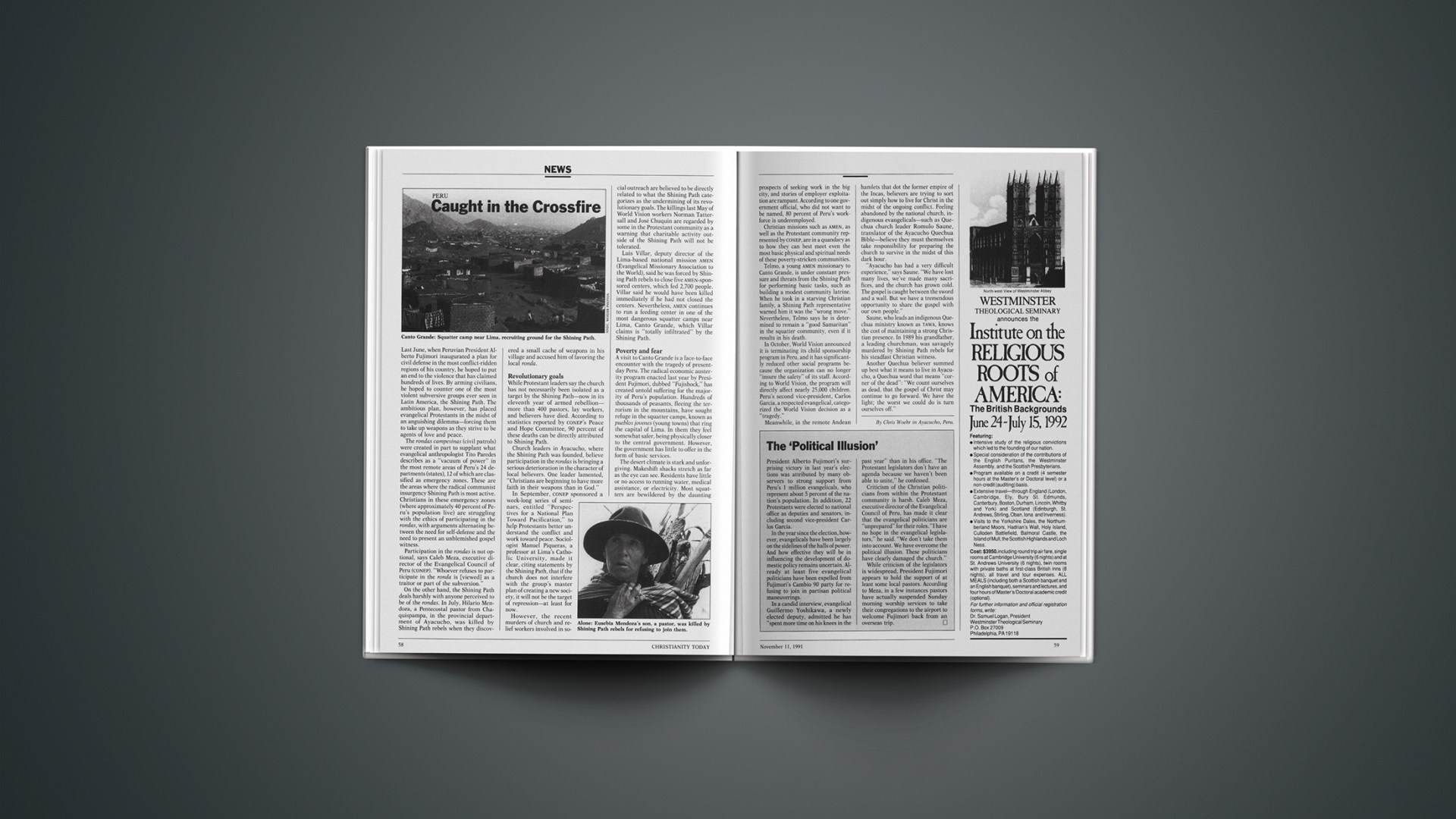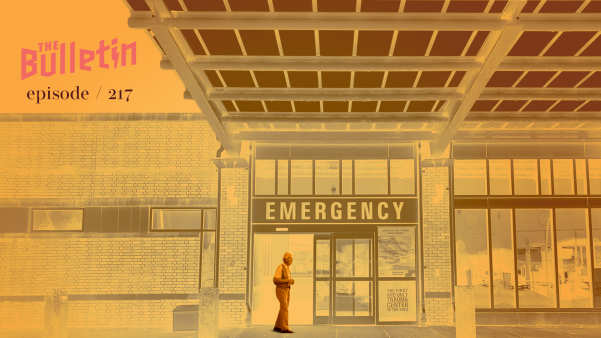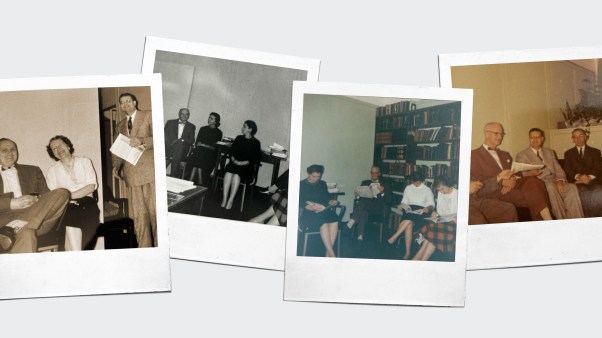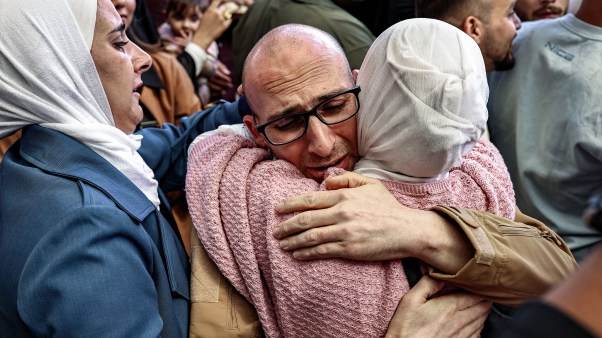Last June, when Peruvian President Alberto Fujimori inaugurated a plan for civil defense in the most conflict-ridden regions of his country, he hoped to put an end to the violence that has claimed hundreds of lives. By arming civilians, he hoped to counter one of the most violent subversive groups ever seen in Latin America, the Shining Path. The ambitious plan, however, has placed evangelical Protestants in the midst of an anguishing dilemma—forcing them to take up weapons as they strive to be agents of love and peace.
The rondas campesinas (civil patrols) were created in part to supplant what evangelical anthropologist Tito Paredes describes as a “vacuum of power” in the most remote areas of Peru’s 24 departments (states), 12 of which are classified as emergency zones. These are the areas where the radical communist insurgency Shining Path is most active. Christians in these emergency zones (where approximately 40 percent of Peru’s population live) are struggling with the ethics of participating in the rondas, with arguments alternating between the need for self-defense and the need to present an unblemished gospel witness.
Participation in the rondas is not optional, says Caleb Meza, executive director of the Evangelical Council of Peru (CONEP). “Whoever refuses to participate in the ronda is [viewed] as a traitor or part of the subversion.”
On the other hand, the Shining Path deals harshly with anyone perceived to be of the rondas. In July, Hilario Mendoza, a Pentecostal pastor from Chaquispampa, in the provincial department of Ayacucho, was killed by Shining Path rebels when they discovered a small cache of weapons in his village and accused him of favoring the local ronda.
Revolutionary Goals
While Protestant leaders say the church has not necessarily been isolated as a target by the Shining Path—now in its eleventh year of armed rebellion—more than 400 pastors, lay workers, and believers have died. According to statistics reported by CONEP’s Peace and Hope Committee, 90 percent of these deaths can be directly attributed to Shining Path.
Church leaders in Ayacucho, where the Shining Path was founded, believe participation in the rondas is bringing a serious deterioration in the character of local believers. One leader lamented, “Christians are beginning to have more faith in their weapons than in God.”
In September, CONEP sponsored a week-long series of seminars, entitled “Perspectives for a National Plan Toward Pacification,” to help Protestants better understand the conflict and work toward peace. Sociologist Manuel Piqueras, a professor at Lima’s Catholic University, made it clear, citing statements by the Shining Path, that if the church does not interfere with the group’s master plan of creating a new society, it will not be the target of repression—at least for now.
However, the recent murders of church and relief workers involved in social outreach are believed to be directly related to what the Shining Path categorizes as the undermining of its revolutionary goals. The killings last May of World Vision workers Norman Tattersall and José Chuquin are regarded by some in the Protestant community as a warning that charitable activity outside of the Shining Path will not be tolerated.
Luis Villar, deputy director of the Lima-based national mission AMEN (Evangelical Missionary Association to the World), said he was forced by Shining Path rebels to close five AMEN-sponsored centers, which fed 2,700 people. Villar said he would have been killed immediately if he had not closed the centers. Nevertheless, AMEN continues to run a feeding center in one of the most dangerous squatter camps near Lima, Canto Grande, which Villar claims is “totally infiltrated” by the Shining Path.
Poverty And Fear
A visit to Canto Grande is a face-to-face encounter with the tragedy of present-day Peru. The radical economic austerity program enacted last year by President Fujimori, dubbed “Fujishock,” has created untold suffering for the majority of Peru’s population. Hundreds of thousands of peasants, fleeing the terrorism in the mountains, have sought refuge in the squatter camps, known as pueblos jovenes (young towns) that ring the capital of Lima. In them they feel somewhat safer, being physically closer to the central government. However, the government has little to offer in the form of basic services.
The desert climate is stark and unforgiving. Makeshift shacks stretch as far as the eye can see. Residents have little or no access to running water, medical assistance, or electricity. Most squatters are bewildered by the daunting prospects of seeking work in the big city, and stories of employer exploitation are rampant. According to one government official, who did not want to be named, 80 percent of Peru’s workforce is underemployed.
Christian missions such as AMEN, as well as the Protestant community represented by CONEP, are in a quandary as to how they can best meet even the most basic physical and spiritual needs of these poverty-stricken communities.
Telmo, a young AMEN missionary to Canto Grande, is under constant pressure and threats from the Shining Path for performing basic tasks, such as building a modest community latrine. When he took in a starving Christian family, a Shining Path representative warned him it was the “wrong move.” Nevertheless, Telmo says he is determined to remain a “good Samaritan” in the squatter community, even if it results in his death.
In October, World Vision announced it is terminating its child sponsorship program in Peru, and it has significantly reduced other social programs because the organization can no longer “insure the safety” of its staff. According to World Vision, the program will directly affect nearly 25,000 children. Peru’s second vice-president, Carlos Garcia, a respected evangelical, categorized the World Vision decision as a “tragedy.”
Meanwhile, in the remote Andean hamlets that dot the former empire of the Incas, believers are trying to sort out simply how to live for Christ in the midst of the ongoing conflict. Feeling abandoned by the national church, indigenous evangelicals—such as Quechua church leader Romulo Saune, translator of the Ayacucho Quechua Bible—believe they must themselves take responsibility for preparing the church to survive in the midst of this dark hour.
“Ayacucho has had a very difficult experience,” says Saune. “We have lost many lives, we’ve made many sacrifices, and the church has grown cold. The gospel is caught between the sword and a wall. But we have a tremendous opportunity to share the gospel with our own people.”
Saune, who leads an indigenous Quechua ministry known as TAWA, knows the cost of maintaining a strong Christian presence. In 1989 his grandfather, a leading churchman, was savagely murdered by Shining Path rebels for his steadfast Christian witness.
Another Quechua believer summed up best what it means to live in Ayacucho, a Quechua word that means “corner of the dead”: “We count ourselves as dead, that the gospel of Christ may continue to go forward. We have the light; the worst we could do is turn ourselves off.”
By Chris Woehr in Ayacucho, Peru.
The ‘Political Illusion’
President Alberto Fujimori’s surprising victory in last year’s elections was attributed by many observers to strong support from Peru’s 1 million evangelicals, who represent about 5 percent of the nation’s population. In addition, 22 Protestants were elected to national office as deputies and senators, including second vice-president Carlos Garcia.
In the year since the election, however, evangelicals have been largely on the sidelines of the halls of power. And how effective they will be in influencing the development of domestic policy remains uncertain. Already at least five evangelical politicians have been expelled from Fujimori’s Cambio 90 party for refusing to join in partisan political maneuverings.
In a candid interview, evangelical Guillermo Yoshikawa, a newly elected deputy, admitted he has “spent more time on his knees in the past year” than in his office. “The Protestant legislators don’t have an agenda because we haven’t been able to unite,” he confessed.
Criticism of the Christian politicians from within the Protestant community is harsh. Caleb Meza, executive director of the Evangelical Council of Peru, has made it clear that the evangelical politicians are “unprepared” for their roles. “I have no hope in the evangelical legislators,” he said. “We don’t take them into account. We have overcome the political illusion. These politicians have clearly damaged the church.”
While criticism of the legislators is widespread, President Fujimori appears to hold the support of at least some local pastors. According to Meza, in a few instances pastors have actually suspended Sunday morning worship services to take their congregations to the airport to welcome Fujimori back from an overseas trip.










